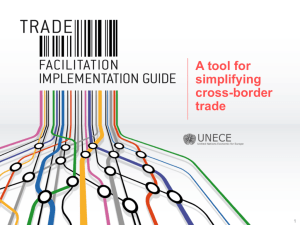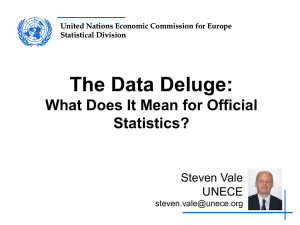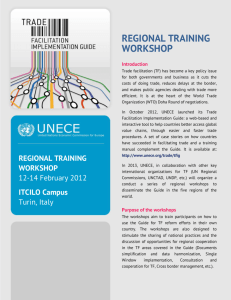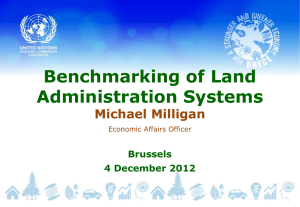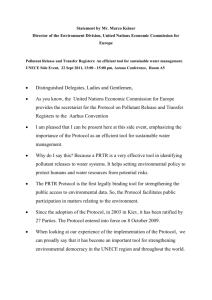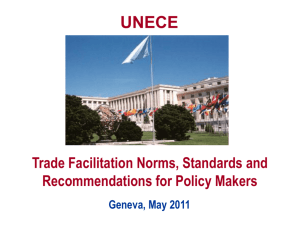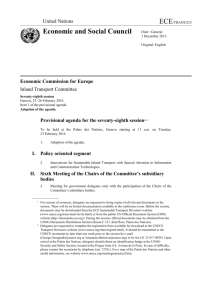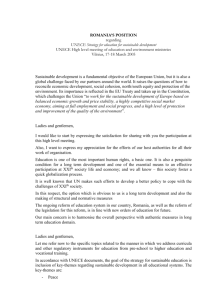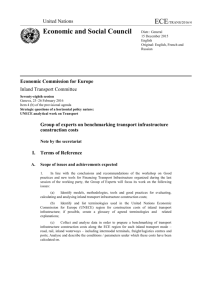Document 10395226
advertisement
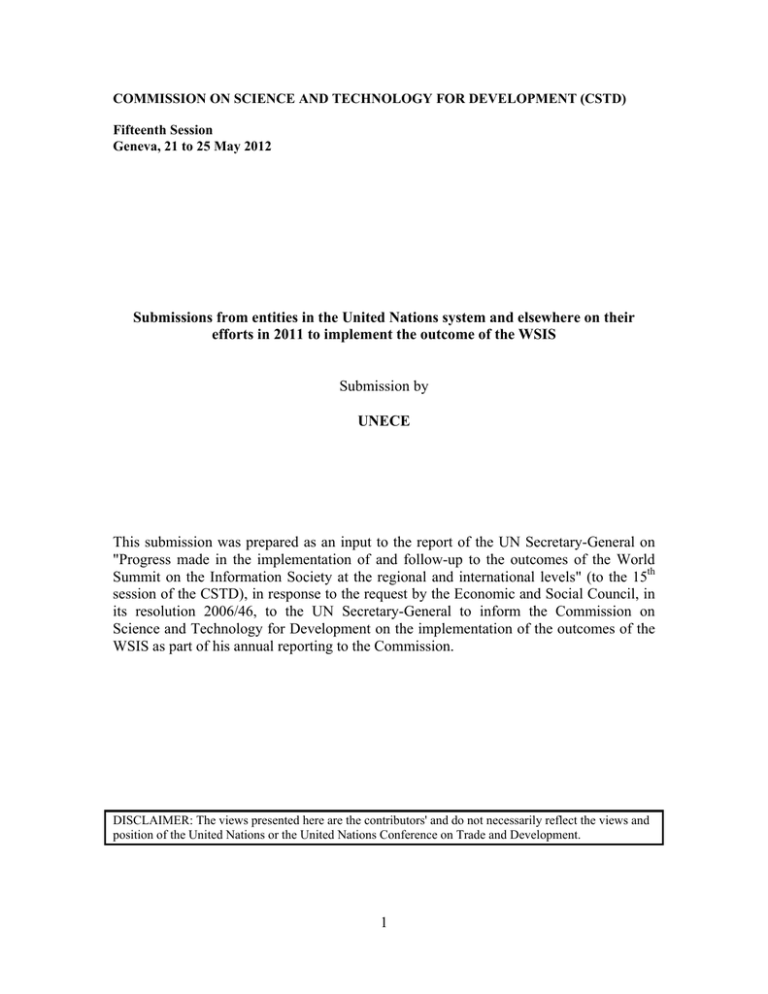
COMMISSION ON SCIENCE AND TECHNOLOGY FOR DEVELOPMENT (CSTD) Fifteenth Session Geneva, 21 to 25 May 2012 Submissions from entities in the United Nations system and elsewhere on their efforts in 2011 to implement the outcome of the WSIS Submission by UNECE This submission was prepared as an input to the report of the UN Secretary-General on "Progress made in the implementation of and follow-up to the outcomes of the World Summit on the Information Society at the regional and international levels" (to the 15th session of the CSTD), in response to the request by the Economic and Social Council, in its resolution 2006/46, to the UN Secretary-General to inform the Commission on Science and Technology for Development on the implementation of the outcomes of the WSIS as part of his annual reporting to the Commission. DISCLAIMER: The views presented here are the contributors' and do not necessarily reflect the views and position of the United Nations or the United Nations Conference on Trade and Development. 1 2011 Report from the United Nations Economic Commission from Europe on Follow-up to the World Summit on the Information Society During 2011, the United Nations Economic Commission for Europe (UNECE) has made a varied contribution to the follow-up to the World Summit on the Information Society. ICT applications are a fundamental part of UNECE activities. In some UNECE programmes, ICT applications constitute the main activity, while in others it may serve mainly as a tool to help attain other objectives. The efforts to implement ICT in sectoral activities are particularly related to UNECE programmes on: (a) environment, (b) trade, (c) transport, (d) statistics and (e) economic cooperation and integration. Thus, the UNECE has made particularly strong contributions during the past year to the WSIS Action Line areas of: Information and communication infrastructure; e-Environment; e-Government; and International and regional cooperation. Smaller, but also important contributions, have been made in Access to information and knowledge; Capacity building; Building confidence and security in the use of ICTs; and e-Agriculture. These contributions are described in more detail below, under the appropriate WSIS Action Line headings. More detailed information about this work can be found on the UNECE web site at http:\\www.unece.org C2 Information and communication infrastructure Public-private partnerships to finance ICT infrastructure: The UNECE organized an International Conference on Knowledge-Based Development and Innovative Entrepreneurship in November 2011 in Baku. One substantive session discussed the role of Public-Private Partnerships (PPP) in financing ICT infrastructure development. It considered how PPPs can be used to bridge the gap between existing and required ICT infrastructure needs. The Conference provided a platform for discussions as well as a broad exchange of experience and lessons learned between ICT policymakers, representatives of business and academia, other experts and practitioners. ICT Standards: UNECE, through its United Nations Centre for Trade Facilitation and Electronic Business (UN/CEFACT), develops standards, norms and best-practice recommendations, including for data and ICT applications, which are aimed at facilitating national and international trade and business transactions. These are technology neutral, free of charge and cover government-to-government, government-tobusiness, and business-to-business communications. UNECE’s UN/CEFACT data and data interchange standards are used globally by hundreds of thousands of users. Since 1989, UNECE (UN/CEFACT) has developed and maintained the United Nations Electronic Data Interchange Standard (UN/EDIFACT). This standard facilitates the exchange of information in many areas, including transport, customs, government and business procurement, just-in-time manufacturing and finance. UN/CEFACT issues and continues to develop a host of data codes for exchanging information, including the United Nations Location Code (LOCODE). It also develops and maintains the United Nations Trade Data Element Directory (TDED) and a Core Component Library that is 2 designed to support interoperability across systems and standards. All of these are updated on a regular basis. One recent key deliverable from UN/CEFACT is the electronic Cross Industry Invoice, which became the basis of the European Core Invoice implementation guidelines that the European Committee on Standardization (CEN) published in September 2011. C3 Access to information and knowledge UNECE’s pioneering work on access to environmental information is described under WSIS Action Line C7-F, e-Environment below. C4 Capacity building While a number of the UNECE’s ICT related activities are global in nature (for example the work on ICT standards and Intelligent Transport Systems), its capacity building work is focused on transition economies within the region. These capacity building activities are varied in nature, corresponding to all of the areas where the UNECE undertakes substantive ICT-related work. Thus, in addition to the specific examples given below, there are other examples of capacity-building activities scattered throughout this report, under different WSIS Action Lines. Capacity building on the use of ICTs to support trade facilitation: UNECE provided advisory services to a large number of transition economies on ICT related aspects of trade facilitation. In addition, a range of workshops were organized such as Cross-Border workshops on trade facilitation, Single Window and data harmonization in Bishkek, Moscow and Odessa and training courses given at the OSCE’s Regional Border Management College in Dushanbe. UNECE also worked with its sister organization, the Regional and Economic Commission for Asia Pacific (UNESCAP), to strengthen the United Nations Network of Experts for Paperless Trade in Asia and the Pacific (UNNExT) which is a community for experts from developing countries and transition economies from Asia and the Pacific involved in the implementation of electronic trade systems and trade facilitation. Supporting activities included: a Regional Meeting of Central Asian countries in Kuala Lumpur; the Asia Pacific Trade Facilitation Forum; a Peer Review of the Mongolian Single Window Master Plan; a Workshop "Towards a Single Window Environment" in Nepal; national workshops on Business Process Analyses in Cambodia, Mongolia and Nepal as well as regional workshops for Central Asian countries in Bangkok and Astana. 3 C5 Building confidence and security in the use of ICTs Land Administration: Successful e-government reforms in land and real estate registration are directly linked to the question of transparency and the fight against fraudulent activities. The use of electronic technology to store and process land registration data is, at present, the norm throughout the UNECE region. Many land administration authorities provide their services through online systems. However, along with opportunities, these systems also present a new, and different, set of challenges for fraud prevention. The UNECE Working Party on Land Administration has studied these phenomena and presented its findings in the publication, "Study on the challenges of fraud to land administration institutions". Based on the analysis of a survey of Member States on online access to land registration information, this study examines: accessibility of systems, experience with fraud and countermeasures. It consolidates and presents good practices in the detection and prevention of fraud in land registration systems in UNECE countries and, in particular, the protection of information against misuse by fraudsters. The publication serves as a tool for improving the understanding and prevention of registration fraud as well as for reviewing and updating relevant legislation and policies. The study also emphasizes the need to create awareness about risks and protective measures among both the public and staff in order to create an anti-fraud culture. The publication is available online at: http://www.unece.org/index.php?id=24802&L=0 C7(A) ICT applications: e-Government Single Window for Export and Import Procedures: The Single Window is one of the most significant government to business and government to government applications, and one that has seen a growing number of implementations and implementation plans across the world, even during this period of economic crisis. The UNECE, through its Centre for Trade Facilitation and electronic Business (CEFACT) has been one of the pioneering organizations in promoting and supporting the implementation of National and Regional Single Windows on a global level. The original Single Window Recommendation (Number 33) was launched by the UNECE in 2004 to enhance the efficient exchange of information between trade and government and during 2011 UN/CEFACT issued two new recommendations to support the Single Window implementation (Recommendation 34 on Data Simplification and Standardization for International Trade and Recommendation 35 on Establishing a legal framework for international trade Single Window) and progress was made on draft Recommendation 36 on Single Window Interoperability. In addition to UN/CEFACT’s continuing work on data and xml messages to support government to business communications and applications, a revision to Recommendation 12 "Measures to facilitate Maritime Transport Documents" was approved. 4 In December 2011, the UNECE organized, together with the four other UN regional commissions, a global Conference on, “Connecting International Trade: Single Windows and Supply Chains in the Next Decade”, which was attended by over 200 leading representatives of government, business and relevant international organizations. The Conference looked at the latest trends, opportunities and technologies for Single Window and information exchange in global trade in order to identify efficient strategies, business models and policy approaches. In its conclusions, the conference requested the UN Regional Commissions to prepare a, “Road Map for the further development of Single Window and Supply Chain automation for cross border trade over the next decade”. At the regional level, UNECE has also undertaken a number of activities to promote Single Window implementation. For example: - - Following joint studies and a series of seminars organized by the UNECE with the Inter-parliamentary Assembly of EurAsEC (Eurasian Economic Community) trade facilitation and, in particular, work on Single Window was included in the EurAsEC work plan. UNECE, in cooperation with the Commission of the Customs Union of Belarus, Kazakhstan and the Russian Federation, organized a Single Window conference in Moscow in April 2011. Intelligent Transport Systems Policy: UNECE continued its commitment to place Intelligent Transport Systems (ITS) on policymakers’ agenda since ITS are important for shaping the future of green mobility and the transport sector. UNECE further developed its strategy package for ITS, which is laying the foundation for future United Nations activities in this area. The strategy package contains three different publications: a general overview of ITS; a strategic note looking at the gaps and impediments to the use of ITS; and the UNECE Road Map on ITS identifying 20 global actions to be performed by UNECE from 2012 to 2020. ITS applications can help transport to become more efficient, safer and greener in the future. These huge potential benefits can only be reaped if ITS solutions are put in place – and are as internationally harmonized as is possible. However, UNECE research has shown that ITS are under-utilized and already, today, we witness the development of different standards around the world and regionally as well as the appearance of diverse liability problems. The core objective of the UNECE strategy on ITS is to lobby for new actions and policies that support the use of ITS to improve the quality of life and to make sustainable, green mobility available across borders. To this end, on 28 February and 1 March 2012, UNECE is dedicating the policy segment of its Inland Transport Committee (ITC) session to Intelligent Transport Systems (ITS). High-level speakers, governments, experts and academia from around the world will come together and focus on the Rio+20 goals, road safety, regional integration, development based on leapfrogging and possible ITS values for a better society. 5 Gas Policy: The Gas Centre Database is an ongoing ECE activity which aims at developing a database for energy policies in general and the gas industry in particular. Built in a flexible, searchable and user-friendly format, the database features an internationally comparable set of data for the gas sector in the ECE region. Land Administration: As part of e-government reforms in the UNECE region, many countries have converted their land registration and real property records from large collections of paper documents into a computerized form. To better understand the challenges that land registry and cadaster organizations face in a networked society, the UNECE Working Party on Land Administration organized an international workshop on: "Land Administration in a networked society" (Amsterdam, 13-14 October 2011). The workshop concluded that, to be effective, e-land administration systems require appropriate legislation and a well extended information network, encompassing all regional administrations within member States; and, in order to create a 'Networked society', one key factor is collaboration between land administration authorities and other government and private organizations. Also see Land Administration under C5 "Building confidence and security in the use of ICTs" C7 (F) ICT applications: e-Environment A leader in using ICT to support the environment, the UNECE has developed ICT tools to support the UNECE Convention on Access to Information, Public Participation in Decision-making and Access to Justice in Environmental Matters (Aarhus Convention) and its Protocol on Pollutant Release and Transfer Registers (PRTR Protocol). These tools are: the Aarhus Clearinghouse Mechanism http://aarhusclearinghouse.unece.org/ , the PRTR Global Portal www.PRTR.net and the National Implementation Reports (NIRs) website http://apps.unece.org/ehlm/pp/nir/index.asp The Aarhus Clearinghouse Mechanism promotes the exchange of information about and good practices in implementation of the Aarhus Convention and principle 10 of the Rio Declaration on Environment and Development. The PRTR Global Portal assists countries in the development, implementation and improvement of PRTR programmes by providing information from countries and organizations around the world. PRTR.net is a joint venture of OECD, Grid Arendal and UNECE and is a remarkable example of inter-organizational cooperation. PRTR.net and The Aarhus Clearinghouse for Environmental Democracy were upgraded project recently by GRID-Arendal. Improvements in PRTR.net included the following: - Multilingualism with information now available in 5 languages: English, French, German, Russian and Spanish 6 - Creation of a global geographic information files page covering PRTR facilities submitted by countries - Addition of a sample Google earth visualization - Inclusion of reports on PRTR capacity building activities The UNECE Aarhus secretariat has also developed a capacity building matrix on PRTR.net with information about past, future and ongoing capacity building activities. In addition, discussions have been initiated with UNITAR on how to develop synergies between PRTR.net and the PRTR Learn website developed by UNITAR. The National Implementation Reports (NIRs) website is an online reporting tool that allows National Focal Points to directly upload the National Implementation Reports after the consultation process is over. The site offers a comparative overview of NIRs and, in particular, it allows the comparison between responses given at different reporting cycles by the same country or by different countries. That way, it becomes easier to identify the progress achieved in the implementation of the Aarhus Convention. C7 (G) ICT applications: e-agriculture The UNECE through its Centre for Trade Facilitation and electronic Business (CEFACT) has been very active in the development of electronic data and messages for exchanging agricultural information. For example, the e-CERT message which allows the exchange of phytosanitary information between business and government as well as between governments. Current, ongoing work includes projects on EDI for Agronomical Observations, Cattle Registration and Livestock Life Records. C11 International and regional cooperation Cooperation on Statistical Information Systems: A new High-Level Group for Strategic Developments in Business Architecture in Statistics, comprising the heads of eight national and international statistical organizations, was established to oversee UNECE’s continuing work on statistical information systems and the development and promotion of standards for statistical data and metadata. This includes a Common Metadata Framework, a Generic Statistical Business Process Model and standards for data and metadata exchange. The potential for significant efficiency savings through shared software development and how this can be facilitated by developing common information architectures was highlighted at a May 2011 meeting in Luxembourg on the Management of Statistical Information Systems that was attended by participants from 39 national and international statistical organizations and organized by the UNECE in cooperation with the statistical office of the European Union (Eurostat) and the OECD. Central Asia and Azerbaijan: The UNECE, through its Economic Cooperation and Integration Division (ECID) has supported regional cooperation and capacity building for 7 the achievement of WSIS targets in the countries of Central Asia and Azerbaijan through the UN Special Programme for the Economies of Central Asia (SPECA). ECE took the lead in establishing the SPECA Project Working Group on ICT for Development (20052007), then the SPECA Project Working Group on Knowledge-based Development (2008 onwards) and has provided a number of ICT related capacity-building activities in support of these Groups. Regional Cooperation to support ICT standards and best implementation practices: UNECE has focused its work in this area on encouraging the participation of economies in transition. Positive developments include: - A regional meeting in Belarus in April, where the Ministries of Communication of eleven CIS countries nominated a Regional Commonwealth for Communication group to work with UN/CEFACT (The UNECE’s United Nations Centre for Trade Facilitation and Electronic Business). - The CIS Interstate Council on Standardization, Metrology and Certification (which unites the standardization bodies of eleven CIS states) in May 2011 which requested assistance from UN/CEFACT in preparing proposals for a potential regional standardization programme on information standards based on UN/CEFACT tools. 8
